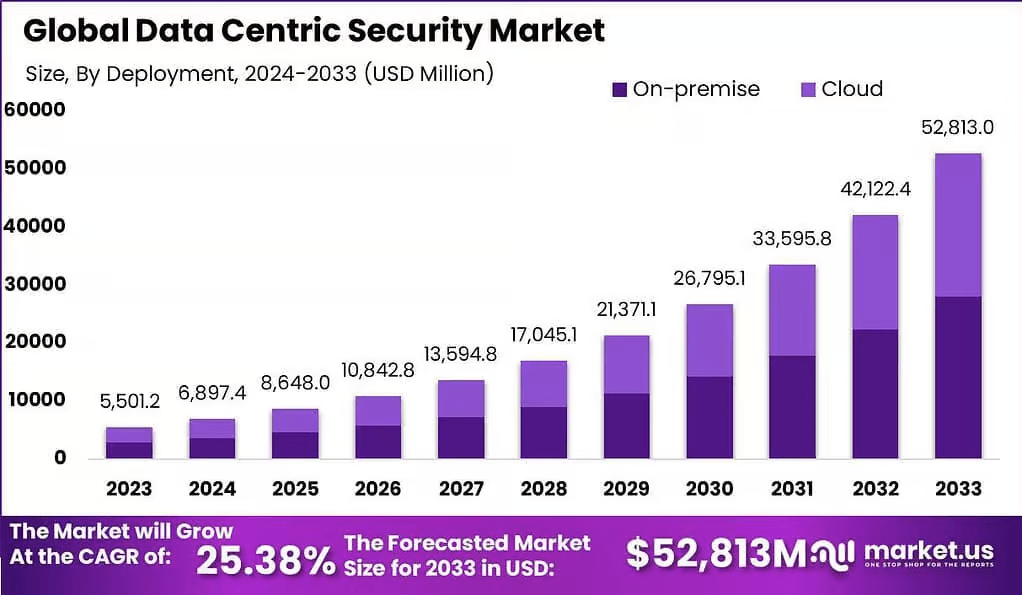Introduction
The Data-Centric Security Market is gaining momentum as organizations prioritize securing data itself—rather than just the networks and systems that contain it—in response to escalating cyber threats, remote work models, and stricter data privacy regulations. Unlike traditional perimeter-based security models, data-centric security focuses on protecting data at rest, in motion, and in use through encryption, access controls, and real-time monitoring. As data becomes the most critical asset in the digital economy, this approach enables businesses to safeguard sensitive information, ensure compliance, and maintain trust in an increasingly decentralized and cloud-driven environment.

Key Takeaways
The data-centric security market is being driven by the surge in data breaches, increasing regulatory requirements like GDPR and CCPA, and the widespread adoption of cloud and hybrid infrastructures. Organizations are shifting from infrastructure-centric to data-first strategies to better control how, where, and by whom data is accessed. Key industries adopting data-centric security include banking, healthcare, government, and retail—where data sensitivity and compliance demands are highest. The convergence of AI and automation with data protection tools is also shaping the future of the market by enhancing real-time threat detection and response capabilities.
Component Analysis
Key components of data-centric security solutions include data discovery and classification tools, encryption and tokenization systems, identity and access management (IAM), data masking, and data loss prevention (DLP) technologies. Data discovery and classification allow organizations to identify and prioritize sensitive information, while encryption and tokenization secure data both at rest and in transit. IAM controls ensure only authorized users access critical data, and DLP systems prevent unauthorized transfers or leaks. These tools are often unified into centralized platforms to provide visibility and control across multicloud, on-premises, and hybrid environments.
Service Analysis
Core services in the data-centric security ecosystem include security consulting, data risk assessments, regulatory compliance support, managed data protection services, and integration of data-centric solutions with existing IT infrastructure. Service providers help organizations implement robust data governance policies, develop encryption strategies, and maintain ongoing compliance with industry standards. Managed security services are particularly valuable for enterprises lacking in-house expertise, providing continuous monitoring, threat response, and analytics. With the shift to remote and hybrid workforces, demand for scalable, cloud-native data protection services has seen a significant uptick.
Key Player Analysis
Leading players in the data-centric security market include Symantec (Broadcom), IBM, Microsoft, McAfee, Varonis Systems, Forcepoint, Thales Group, and Informatica. These companies offer comprehensive data protection suites integrating encryption, DLP, cloud access security, and identity governance. IBM and Microsoft lead in providing cloud-first, enterprise-grade solutions with advanced analytics, while Varonis and Forcepoint specialize in data behavior monitoring and insider threat protection. Thales is renowned for its encryption and key management solutions, especially in compliance-sensitive sectors. Strategic partnerships, AI integration, and acquisitions are helping these firms expand their capabilities and market reach.
Top Market Leaders
- Egnyte
- Virtru
- Netwrix
- Sophos
- Informatica
- IBM Corporation
- Broadcom
- Varonis Systems
- Micro Focus
- Orange Cyberdefense
- Infogix
- Other key players
Conclusion
As data becomes more distributed, dynamic, and valuable, the shift to a data-centric security model is no longer optional—it is imperative. By focusing on protecting the data itself, organizations can achieve stronger security postures, reduce regulatory risk, and gain greater visibility and control in a complex digital landscape. The data-centric security market is thus poised to become a cornerstone of modern cybersecurity strategies worldwide.
The macro analyst desk brings highly sought after financial news based on market analysis, insider news and company filings.
